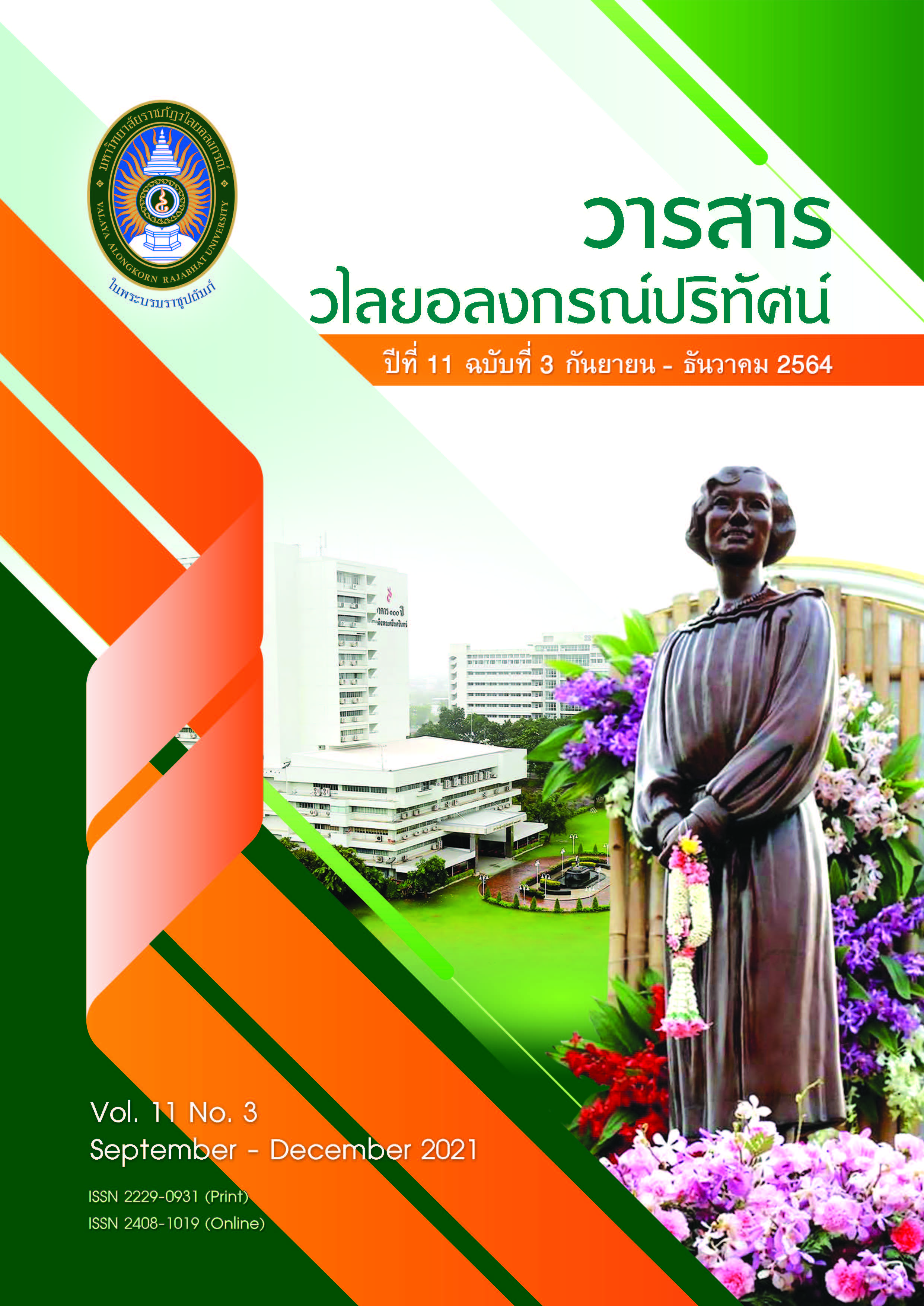การพัฒนาจริยธรรมที่เหมาะสมในองค์การตามการสอนของพระพุทธเจ้า
คำสำคัญ:
การพัฒนาจริยธรรม, คำสอนของพระพุทธเจ้าบทคัดย่อ
การศึกษาการพัฒนาจริยธรรมที่เหมาะสมในองค์การตามการสอนของพระพุทธเจ้า มีวัตถุประสงค์เพื่อศึกษาการสอนและส่งเสริมคำสอนของพระพุทธเจ้าในการพัฒนาจริยธรรมที่เหมาะสมในองค์การ โดยรวบรวมข้อมูลจากพระไตรปิฎก หนังสือ ตำรา และงานวิจัยที่เกี่ยวข้อง และทำการวิเคราะห์และสังเคราะห์ความรู้ เรียบเรียงและพรรณนาตามวัตถุประสงค์ โดยผลการศึกษาคือ ด้านการสอน พระพุทธเจ้าได้จำแนกประเภทผู้รับคำสอนตามระดับสติปัญญาและอุปนิสัยของมนุษย์เปรียบเทียบกับดอกบัวในสระ และเลือกวิธีการและหลักการที่เหมาะสมในการพัฒนา การสอนของพระพุทธเจ้าแบ่งได้ 3 องค์ประกอบสำคัญคือ การสอน เนื้อหา และผู้รับคำสอน เน้นการให้ความสำคัญด้านเนื้อหา ประโยชน์ และผู้รับคำสอน ด้วยวิธีที่หลากหลาย เช่น แบบสนทนา แบบบรรยาย แบบตอบปัญหา และแบบหลักเกณฑ์ตายตัว ใช้กลยุทธ์และวิธีดึงดูดความสนใจเช่น การยกอุทาหรณ์ การอุปมา การใช้สื่ออุปกรณ์ ตัวอย่าง ภาษา บุคคล โอกาส ความยืดหยุ่น รางวัลและการลงโทษ ด้านคำสอน เป็นคำสอนที่เน้นพัฒนาในด้านศีล (ความประพฤติ) สมาธิ (ความมั่นคงด้านจิตใจ) และปัญญา (ความรู้ความเข้าใจอย่างแจ่มแจ้ง) การศึกษาครั้งนี้แบ่งคำสอนออกเป็น 4 ด้านคือ ด้านความประพฤติเช่น อัปปมาทะ กรรม ทุจริต สุจริต บุญกิริยาวัตถุ 3 อิทธิบาท 4 สัมมัปปธาน 4 เบญจศีล เบญจธรรม มรรคมีองค์ 8 บารมี 10 ทศพิธราชธรรม ด้านอารมณ์ เช่น กุศลมูลและอกุศลมูล พรหมวิหาร 4 ความลำเอียง ด้านจิตใจเช่น หิริ โอตตัปปะ สติ สัมปชัญญะ ไตรลักษณ์ อธิปไตย 3 อริยสัจ 4 และด้านสังคมเช่น กัลยาณมิตร ปาปณิกธรรม 3 ฆราวาสธรรม 4 จักร 4 สังคหะวัตถุ 4 สัปปุริสธรรม 7 โดยในเชิงปฏิบัติควรเริ่มด้วยการจำแนกบุคคลด้านจริยธรรม การเลือกวิธีการสอนและคำสอนที่เหมาะสม และมีหลักปฏิบัติที่ดีในการสอน การค้นพบที่สำคัญของการศึกษาครั้งนี้คือ กระบวนการพัฒนาจริยธรรมในองค์พระพุทธองค์ประกอบด้วยขั้นตอนสำคัญ คือ การพิจารณาความเหมาะสมของบุคคลที่มีจริยธรรมในด้านสติปัญญา ความรู้ ความสามารถ และอุปนิสัยส่วนตัว และการเลือกวิธีการสอนและหัวข้อการสอนที่ เหมาะสมกับบุคคลที่มีแนวทางการสอนที่ดี ซึ่งเป็นปัจจัยสำคัญที่จะช่วยให้การสอนประสบความสำเร็จ
เอกสารอ้างอิง
กิจจา บานชื่น. (2560). มนุษยสัมพันธ์ในองค์การ. กรุงเทพฯ: ซีเอ็ดยูเคชั่น.
กรมอาเซียน กระทรวงการต่างประเทศ. (2556). ASEAN mini book. กรุงเทพฯ: Page Maker.
คณะกรรมการส่งเสริมคุณธรรมแห่งชาติ. (2559). แผนแม่บทส่งเสริมคุณธรรมแห่งชาติ ฉบับที่ 1 (พ.ศ. 2559-2564) ตามมติคณะรัฐมนตรี เมื่อวันที่ 12 กรกฎาคม 2559. กรุงเทพฯ: กระทรวงวัฒนธรรม กรมการศาสนา. [ออนไลน์], เข้าถึงได้จาก: https://www.m-culture.go.th/prachinburi/article_attach/article_fileattach_20180504132514.pdf (2564, 20 เมษายน)
ชัยพร วิชชาวุธ และธีระพร อุวรรณโณ. (2525). แนวคิดและการพัฒนาใหม่ในการปลูกฝังจริยธรรม. กรุงเทพฯ: สำนักพิมพ์จุฬาลงกรณ์มหาวิทยาลัย.
นพพร พุกกะนันท์. (2543). จริยธรรมทางธุรกิจ. กรุงเทพฯ: ห้างหุ้นส่วนจำกัด ป. สัมพันธ์พาณิชย์.
บำรุง โพธิ์ศรี. (2554). ปัจจัยที่มีผลต่อการปลูกฝังคุณธรรมและจริยธรรมของนักศึกษา วิทยาลัยเทคโนโลยีสยาม เขตบางกอกใหญ่ กรุงเทพมหานคร. พุทธศาสตรมหาบัณฑิต สาขาวิชาการบริหารการศึกษา มหาวิทยาลัยมหาจุฬาลงกรณราชวิทยาลัย.
บุญรอด อมรทัตโต, พิเชฐ ทั่งโต และบุษกร วัฒนบุตร. (2560). การส่งเสริมจริยธรรมตามแนวทางพระพุทธศาสนา องค์การปกครองส่วนท้องถิ่นในจังหวัดระยอง. วารสาร มจร สังคมศาสตร์ปริทรรศน์. 6(2): 281-294.
พระพรหมคุณาภรณ์ (ประยุทธ์ ปยุตฺโต). (2556). พุทธวิธีในการสอน. กรุงเทพฯ: พิมพ์สวย.
พระพรหมคุณาภรณ์ (ประยุทธ์ ปยุตฺโต). (2559). พจนานุกรมพุทธศาสตร์ ฉบับประมวลธรรม. กรุงเทพฯ: มูลนิธิการศึกษาเพื่อสันติภาพ พระธรรมปิฎก (ป. อ. ปยุตฺโต).
พระราชบัญญัติมาตรฐานทางจริยธรรม พ.ศ. 2562. (2562, 16 เมษายน). ราชกิจจานุเบกษา. เล่มที่ 136 ตอนที่ 50 ก หน้า 1-10 [ออนไลน์], เข้าถึงได้จาก: http://www.ratchakitcha.soc.go.th/DATA/PDF/2562/A/050/T_0001.PDF (2564, 18 พฤษภาคม)
มหาจุฬาลงกรณราชวิทยาลัย. (2560). พระไตรปิฎกภาษาไทย ฉบับมหาจุฬาลงกรณราชวิทยาลัย. (เล่มที่ 21). (หน้า 205). พิมพ์ถวายเป็นพระราชกุศลแด่ พระบาทสมเด็จพระปรมินทรมหาภูมิพลอดุลยเดช. กรุงเทพฯ: โรงพิมพ์มหาจุฬาลงกรณราชวิทยาลัย.
รัฐธรรมนูญแห่งราชอาณาจักรไทย พุทธศักราช 2560. (2560, 6 เมษายน). ราชกิจจานุเบกษา เล่ม 134 ตอนที่ 40 ก หน้า 1-20 [ออนไลน์], เข้าถึงได้ที่: https://cdc.parliament.go.th/draftconstitution2/ewt_dl_link.php?nid=1038&filename=index (2564, 18 พฤษภาคม)
ศูนย์คุณธรรม (องค์การมหาชน). (2564). แนวทางการส่งเสริมองค์กรคุณธรรม. กรุงเทพฯ: กระทรวงสาธารณสุข. [ออนไลน์], เข้าถึงได้จาก: http://www.stopcorruption.moph.go.th/application/editors/userfiles/files/แนวทางการส่งเสริมองค์กรคุณธรรม.pdf (2564, 20 พฤษภาคม)
ศูนย์คุณธรรม. (2551). เอกสารประกอบการประชุมวิชาการ เปิดขอบฟ้าคุณธรรมจริยธรรม. การประชุมวิชาการและเผยแพร่ผลงานวิจัยด้านคุณธรรมจริยธรรม. กรุงเทพฯ: ห้างหุ้นส่วนจำกัด เชน ปลิ้นติ้ง.
สมคิด บางโม. (2558). จริยธรรมทางธุรกิจ. กรุงเทพฯ: สำนักพิมพ์ เอส เค บุ๊คส์.
สุภาพร พิศาลบุตร. (2554). จริยธรรมทางธุรกิจ. (พิมพ์ครั้งที่ 18). กรุงเทพฯ: โรงพิมพ์จุฬาลงกรณ์มหาวิทยาลัย.
สำนักงานบริหารแรงงานต่างด้าว. (2564). สถิติจำนวนคนต่างด้าวที่ได้รับอนุญาตทำงานคงเหลือทั่วราชอาณาจักร ประจำเดือนมีนาคม ปี 2564. กรุงเทพฯ: กรมการจัดหางาน. [ออนไลน์], เข้าถึงได้จาก: https://www.doe.go.th/prd/assets/upload/files/alien_th/a0bf3232bdb42f5fe6dbe66cfa75b02c.pdf (2564, 15 พฤษภาคม)
อร่าม อินพุ่ม. (2537). มงคลชีวิต 38 ประการ สำหรับผู้ครองเรือน. กรุงเทพฯ: เพชรกะรัต.
ดาวน์โหลด
เผยแพร่แล้ว
รูปแบบการอ้างอิง
ฉบับ
ประเภทบทความ
สัญญาอนุญาต
ข้อความที่ปรากฏในบทความแต่ละเรื่องในวารสารวไลยอลงกรณ์ปริทัศน์ เป็นความคิดเห็นของผู้นิพนธ์แต่ละท่าน มิใช่เป็นทัศนะและมิใช่ความรับผิดชอบของกองบรรณาธิการจัดทำวารสาร และ
มหาวิทยาลัยราชภัฏวไลยอลงกรณ์ ในพระบรมราชูปถัมภ์


